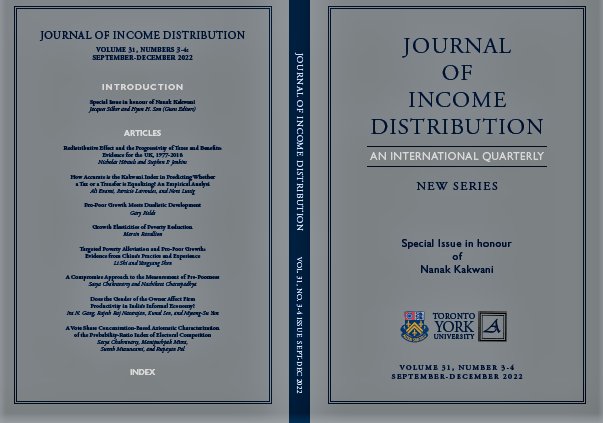How Accurate is the Kakwani Index in Predicting Whether a Tax or a Transfer is Equalizing?
An Empirical Analysis
DOI:
https://doi.org/10.25071/1874-6322.40543Keywords:
Kakwani index, fiscal redistribution, reranking, progressivity, marginal contribution, taxes, transfers, Lambert, Kakwani index, fiscal redistribution, reranking, progressivity, marginal contribution, taxes, transfers, LambertAbstract
The Kakwani index of progressivity is commonly used to establish whether
the effect of a specific tax or transfer is equalizing. In the presence of
reranking or Lambert’s conundrum, however, a progressive tax could be
unequalizing. While it is mathematically possible for counter-intuitive
results to occur, how common are they in actual fiscal systems? Using a
novel dataset that includes fiscal-incidence results for 39 countries, we find
that the likelihood of the Kakwani index to be progressive (regressive),
while the tax or transfer is unequalizing (equalizing), is minimal, except in
the case of indirect taxes: in roughly 25 per cent of our sample, regressive
indirect taxes are equalizing (sign-inconsistent cases). Additionally, the
likelihood that the Kakwani index ranks the magnitude of the impact of a
tax or transfer wrongly also exists but it too is small. Finally, using
regression analysis, we find that increasing the size or progressivity of a
progressive tax or transfer is equalizing and statistically robust for
sign-consistent cases. For sign-inconsistent cases, the coefficient for the
Kakwani index is not statistically significant. In sum, although the
Kakwani index could yield interpretations that are inaccurate in actual
fiscal systems, the risk seems small, except for indirect taxes.
References
Coady, David, Moataz El-Said, Robert Gillingham, Kangni Kpodar, Paulo Medas, and David Newhouse 2006 “The Magnitude and Distribution of Fuel Subsidies: Evidence from Bolivia, Ghana, Jordan, Mali, and Sri Lanka”, International Monetary Fund Working Paper 06/247.
Duclos, Jean-Yves, and Abdelkrim Araar 2006 Poverty and Equity: Measurement, Policy and Estimation with DAD Economic Studies in Inequality, Social Exclusion and Well-Being 2. New York: Springer/International Development Research Center.
Enami, Ali 2018 “Measuring the Redistributive Impact of Taxes and Transfers in the Presence of Reranking”, in Nora Lustig (Ed.) Commitment to Equity Handbook: Estimating the Impact of Fiscal Policy on Inequality and Poverty Hanover, PA: Brookings Institution Press and
CEQ Institute, Tulane University, pp. 116–174. http://www.commitmentoequity.org.
—–, Nora Lustig, and Rodrigo Aranda 2018 “Analytic Foundations: Measuring the Redistributive Impact of Taxes and Transfers”, in Nora Lustig (Ed.) Commitment to Equity Handbook: Estimating the Impact of Fiscal Policy on Inequality and Poverty Brookings Institution Press
and CEQ Institute, Tulane University, pp. 56–115. http://www.commitmentoequity.org.
Higgins, Sean, and Nora Lustig 2018 “Allocating Taxes and Transfers and Constructing Income Concepts: Completing Sections A, B, and C of the CEQ Master Workbook”, in Nora Lustig (Ed.) Commitment to Equity Handbook: Estimating the Impact of Fiscal Policy on Inequality
and Poverty Hanover, PA: Brookings Institution Press and CEQ Institute, Tulane University, pp. 219–279. http://www.commitmentoequity.org.
Kakwani, Nanak C. 1977 “Measurement of Tax Progressivity: An International Comparison”, Economic Journal 87, (345): 71–80.
Kiefer, Donald W. 1984 “Distributional tax progressivity indexes”, National Tax Journal 37(4): 497–513.
Lambert, Peter 1985 “On the Redistributive Effect of Taxes and Benefits”, Scottish Journal of Political Economy 32(1): 39–54.
—– (Ed.) 2001 The Distribution and Redistribution of Income, 3rd ed. New York and Manchester: Manchester University Press.
Lustig, Nora (Ed.) 2018 Commitment to equity handbook: Estimating the impact of fiscal policy on inequality and poverty Hanover, PA: Brookings Institution Press.
—– 2020 “Measuring the distributional impact of taxation and public spending: The practice of fiscal incidence analysis”, Oxford Research Encyclopedia of Economics and Finance. DOI: 10.1093/acrefore/9780190625979.013.363
Mandal, B.N. 2009 Global Encyclopaedia of Welfare Economics. New Dehli: Global Vision Publishing Co.
Musgrave, Richard A., and Tun Thin 1948 “Income tax progression, 1929–48”, Journal of Political Economy 56(6): 498–514.
Pechman, Joseph A., and Benjamin A. Okner 1974 Who Bears the Tax Burden? Studies of Government Finance Series Washington: The Brookings Institution





